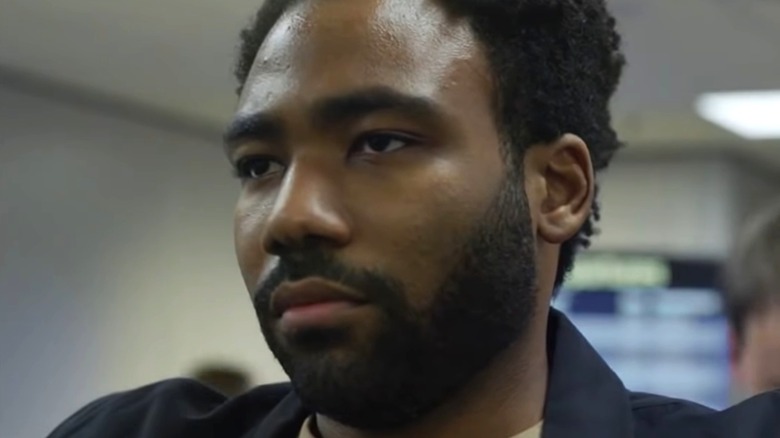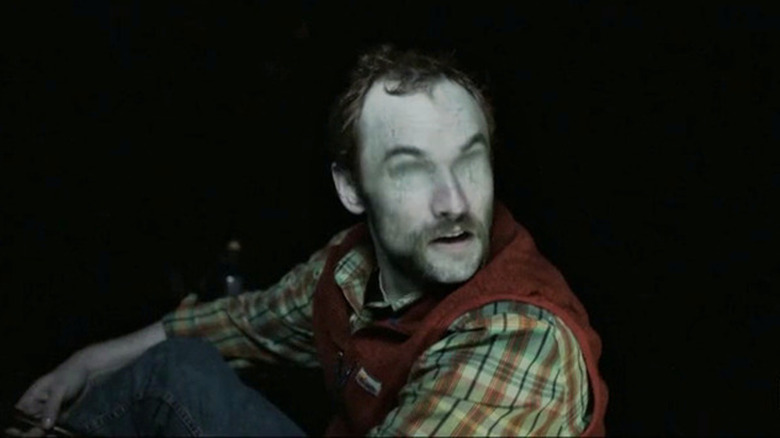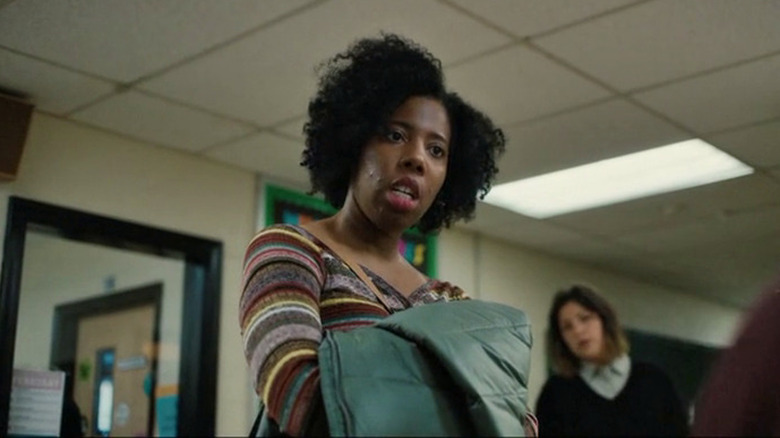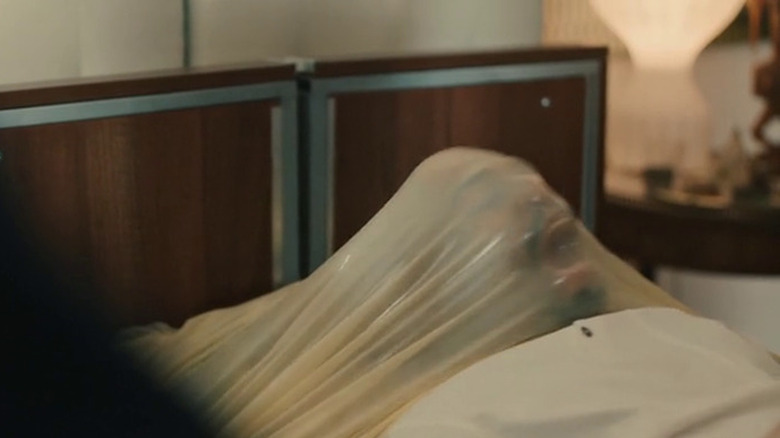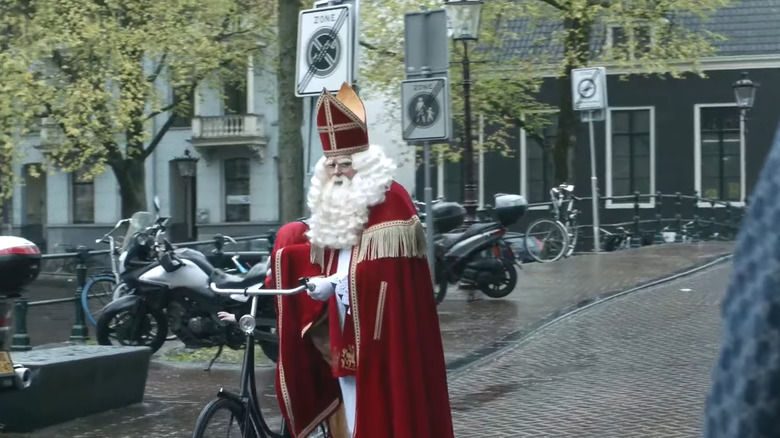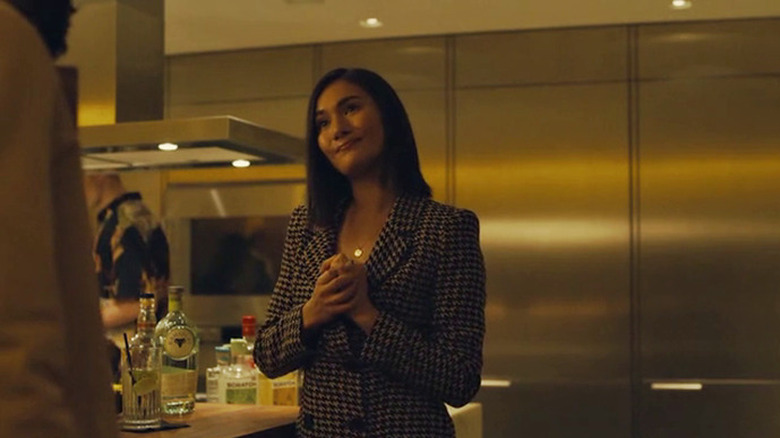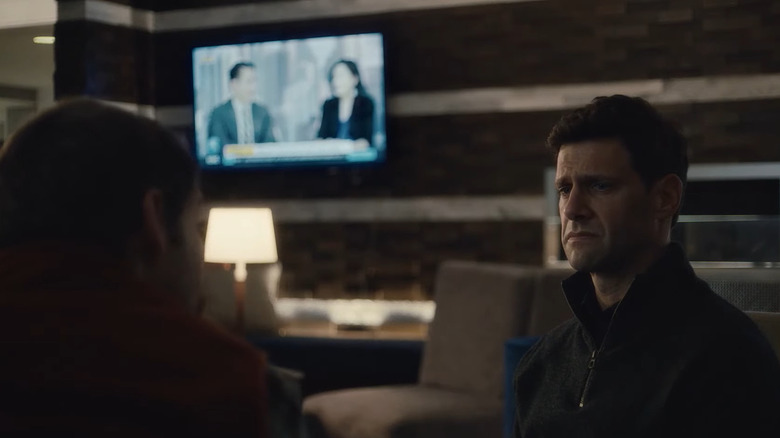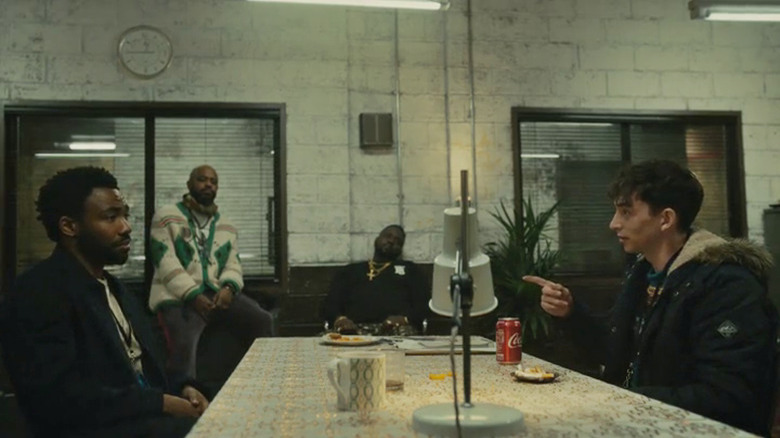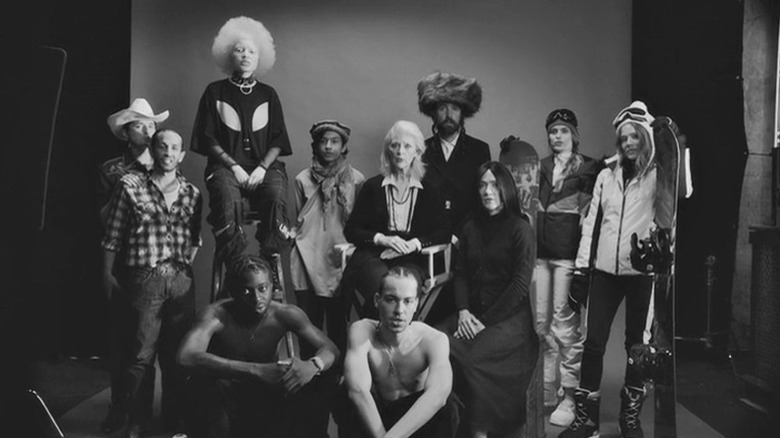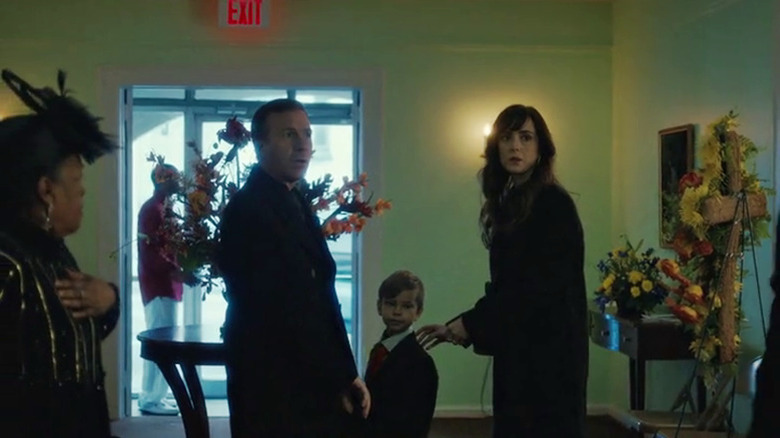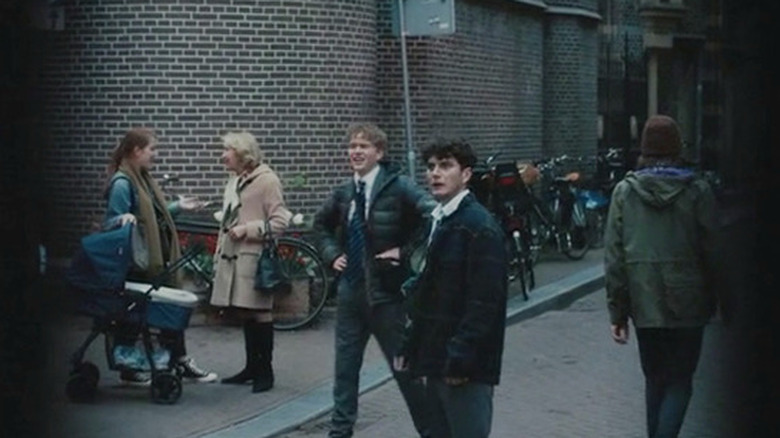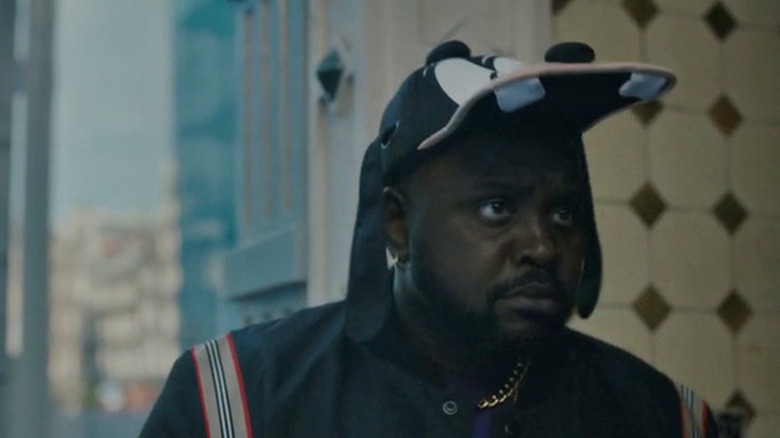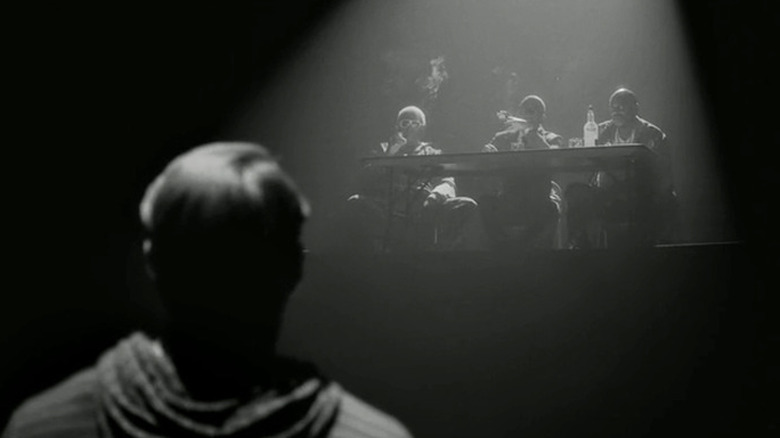The Creepiest Moments In Atlanta Season 3
Donald Glover's "Atlanta" is one of the weirdest, creepiest, and most uncomfortable programs on television right now. If you live in the United States, this show was made to trigger you. The creators and the main cast (Glover, Brian Tyree Henry, LaKeith Stanfield, and Zazie Beetz) aren't afraid to touch on controversial and sensitive topics. In fact, they thrive when tackling them head-on. Inequality, racism, family, gender norms, and wokeness are constantly discussed in "Atlanta," combined with grotesque humor and inexplicable "Twin Peaks"-like events.
Due to scheduling and production issues (and the coronavirus pandemic), Season 3 was delayed for years, but it's now safe to say that it was worth the wait. Bigger and more popular than ever, the latest season feels like the show's peak in almost every aspect. The freedom that Glover and his crew acquired from FX over the years is palpable in the latest season. The primary storyline takes place in Europe instead of the US, and some episodes serve as standalone mini-films without featuring any of the regular actors. There were no limitations whatsoever on what they could and could not do. However, this makes Season 3 darker and more disturbing than ever before, filled with thought-provoking and horrifying elements.
Here, we gathered the freakiest and creepiest ones, which fans will definitely appreciate.
(Warning: Spoilers ahead.)
The dead town under the lake
"Three Slaps," the first episode of Season 3, sets the tone for the next nine. It begins as an atmospheric horror when it shows two men (white and Black) in a boat, fishing on a lake in the dark. We have never seen them before. The Black man tells the other how he almost drowned here a long time ago. The white man isn't surprised. He says that there's a whole town underneath the water — buildings, roads, barns, and an entire raceway — but everyone who lived there died because the government flooded the place. Their souls, though, have never left, and they haunt the lake and its surroundings to this day. In fact, they might be closer to them than they think. It's a classic ghost story.
This setup is radically different from the "Atlanta" of the first two seasons, and there's a unique spin on this narrative. You can sense that something bad is coming when the Caucasian man explains his theory on what it means to be white. He begins, "White is where you are. It's when you are," and continues with this weird monologue for about a minute. It's a creepily effective sequence because of the spooky setting. We're not sure whether it's a dream or something real, but it serves as the perfect beginning to an unsettling season.
A mother disciplines her son and forces him to dance
After that eerie cold open, we're introduced to a Black kid named Loquareeous (Christopher Farrar). He's in class when the teacher tells all the students that they've got an opportunity to go and watch "Black Panther 2." He gets so excited that he immediately starts dancing on top of the table, and his peers join in to celebrate with him. Not long after, he's sitting in the principal's office, waiting for his mom and grandfather, who got called in to discuss his disruptive behavior. They come and listen to what the principal and the school's guidance counselor have to say.
Once they leave the office, Loquareeous's mother demands he dance in the corridor. He's embarrassed and uncomfortable but can't disobey his mother. He begins reluctantly dancing when the guidance counselor appears behind them, saying this isn't necessary. However, she's ignored. Eventually, the boy's grandpa walks up to him, slaps him three times, and asks him what his problem is.
Whether emotional or physical, it's always upsetting to see a child getting abused by family on the screen. However, this scene is essential to the plot and the bigger picture. Although the depiction is raw and alarming, it gets across the point the creators are trying to make. In the end, we'll understand why Loquareeous's mom isn't necessarily a bad parent.
Fake Tupac's death
In Episode 2, "Sinterklaas is Coming to Town," Darius (LaKeith Stanfield) and Van (Zazie Beetz) visit Amsterdam, where a man — surrounded by people dressed in white — is dying. Darius says that it must be Tupac Shakur, the infamous rapper who died after being shot four times in Las Vegas in 1996. He explains that there's a theory that Tupac faked his death and went to live in the Caribbean in secret. It's nothing more than an urban myth, which was often mentioned after the rapper's death — although USA Today notes that some people still believe in it today.
This scene seems like a joke until it becomes way too real. The people around "Tupac" seem like members of some kind of death cult, waiting for him to say goodbye and depart this world. Van even decides to stand next to him, hold his hand, and say a few comforting words. Once she does that, one of the ladies uses a remote control to start a mechanism positioned above the man's head. After being set in motion, a plastic sheet comes down and suffocates him while lying in bed. The air freezes for long seconds as everyone witnesses how he struggles and dies in front of them. It's hard to tell who's freaked out more: Van and Darius or the viewers watching at home.
Blackface in Amsterdam
In the same episode, Earn (Glover) has to bail Alfred (Brian Tyree Henry) out of jail after he had an incident with two local women. As they walk to their ride, they see a man dressed in a Dutch Santa costume carrying a child on a bike whose face is painted black. It's a surreal moment that leaves the two baffled. Right after, Earn asks their driver about it. He explains that it's an old tradition called Zwarte Piet, which has been passed down from generation to generation. The kids' faces are all black because they fell down the chimney while helping St. Nicholas. Earn notes that it feels pretty racist but decides to ignore it. When they arrive at their hotel, a doorman welcomes them also in full blackface.
This eerie, grotesque, and racially charged humor has always been part of the series. Here, the whole point is to emphasize that some countries still have traditions that are racially offensive. Time reports that many believe these Zwarte Piet should die out or be changed completely, and its inclusion in "Sinterklaas is Coming to Town" gives a bizarre vibe to the entire episode.
Enraged Brits bullying an Asian woman
In Episode 3, "The Old Man and the Tree," the crew goes to a billionaire's party in London. After getting there, they spread out to explore the place and meet the guests. Darius bumps into an Asian woman who misunderstands his intentions. She thinks he's hitting on her while Darius actually just wants a drink. They clear up the situation quickly and chat about Black and Asian culture. No harm done. However, when she leaves, a young British guy steps up to Darius, saying he saw what just happened and thought how the woman responded was messed up. Darius says it was no big deal, but the guy insists.
As the evening moves along, the Brit tells other white guests how this interaction went down — embellishing the whole thing and pointing out how rude she was. Darius says that's not true, but nobody listens. Then the woman returns and asks him to come over and meet her fiancé. However, the others notice and begin bullying her, highlighting how racist she was. It's a brief but baffling scene, turning cultural stereotypes on their head. It's kind of a dark joke, but the implications about white guilt and racism are clearly there, which makes the whole situation even more troubling.
E's Suicide
The eerie white man we saw in the season opener returns at the end of the episode "The Big Payback." He's staying at the same hotel where Marshall (Justin Bartha) stays after being accused of having ancestors who were slave owners. As Marshall sits in the bar, wondering where all went wrong, the eerie white man, E, introduces himself. E gives a speech about how his grandfather built everything they had from the ground up. However, it turns out that he had a lot of help since he was also a slave owner. This dialogue ends up being a pretty interesting argument about slavery and how white people treat it as a mystery buried in the past that they can investigate if they decide to. Yet simply admitting that it was wrong doesn't make it right.
Once E is done with his monologue, he goes outside for a cigarette while Marshall reconsiders his thoughts. However, E is still visible in the background, slowly raising a gun to his head and pulling the trigger. Then his corpse falls into the pool and floats around as his blood gradually darkens the water. In the world of "Atlanta," it doesn't get much darker than that.
If you or anyone you know is having suicidal thoughts, please call the National Suicide Prevention Lifeline at 1-800-273-TALK (8255).
Earn and Alfred interrogate a fan
In Episode 5, "Cancer Attack," Paper Boi plays a concert in Budapest. Before he begins the show, he's got a meet and greet with a young fan with cancer. Once the concert ends, Alfred is backstage, looking for his phone but can't find it. Earn tells him to retrace his steps, and Alfred says he had it before meeting the kid. Earn tracks the kid down, but he doesn't have the phone. They realize that the manager's nephew, Wiley (Samuel Blenkin), who was warming the crowd up before the performance started, stayed backstage all night. They decide he must've taken the phone. Wiley returns and talks to Alfred and Earn in an empty office. The guys are sure that he stole the phone because he reveals some information that's clearly on it.
They attempt to reason with him, asking him nicely while playing good cop bad cop. Nothing seems to work, and the situation is getting intense. Wiley asks random questions, which makes things worse. He's toying with them, playing the fool while he clearly knows what they want. At one point, he even performs a song with a guitar and tells them about his past — all while continuing to deny that he has the phone. This is one of those suspenseful and nerve-racking moments that "Atlanta" does better than any other show. This sequence creates an uncomfortable, terrifying atmosphere that's compelling on a different level, and it's perhaps the best scene in Season 3.
Reinvest in Your Hood
In Episode 6, Alfred, Earn, and Darius meet with an Italian fashion designer and his team who need Paper Boi's help to clear up a recent mix-up. In exchange for free clothes, the rapper agrees to participate. Eventually, as part of a campaign, the company makes a commercial based on Al's idea (which initially came from Earn) to help Black entrepreneurs and business owners and teach them how to reinvest in their communities.
We see the black and white video produced for the "Reinvest in Your Hood" campaign, narrated by Paper Boi, totally out of context. It features white gay cowboys, orthodox Jewish people, skier girls, a goat, and an old woman claiming that they're "all from some hood." It's the most capitalist and tone-deaf advertisement made by white people exploiting cultural inequalities. It's entirely off the point of what Paper Boi was trying to achieve with this idea. Not surprisingly, he storms in on a meeting to call them out on it. These things frequently happen in the entertainment industry, and "Atlanta" nails it in its most unethical and unapologetic way possible. Kudos.
Sylvia's Funeral
Episode 7, "Trini 2 De Bone," is a standalone story introducing us to a white couple whose Trinidadian nanny, Sylvia, just passed away. Given how much their son, Sebastian (Indy Sullivan Groudis), adored her, they decide to attend her funeral as a family. It's a traditional ceremony, and they are the only white people there.
Everything's going well until Sylvia's daughter gets to the microphone and interrupts a dance routine performed by a group honoring the deceased. She tells the crowd that her mom's selflessness wasn't accurate. She was never there for her children because she was always working, taking care of other people's kids. Her accusations rile everyone up, and several fights break out between the attendees.
Sebastian and his family try to sneak out before things go off the rails completely. They're clearly afraid of what could happen. However, a relative of Sylvia's takes hold of the mic and orders the crowd to stop this behavior. He says that they're scaring the white people — especially Sebastian. In the end, though, he explains to him that it's all okay because that's how Trinidadian people grieve when they're sad. It's a dramatic scene, but you can sense that something is off. This might not exactly be a spooky moment, but it's quite tumultuous and chaotic in a hilarious way.
Teenagers in Amsterdam throwing an infant around
In Episode 8, "New Jazz," Darius and Alfred are in Amsterdam, visiting a place to try a drug called Nepalese Spacecake that is banned in the US. Apparently, it's a hallucinogen that makes you trip pretty hard. They consume it in a little coffee shop before taking a stroll to the spa. On their way, Alfred sees some very unusual things, but viewers can't quite be sure if these are real or just hallucinations.
At one point, while Darius is trying to find a shortcut, a group of teenage boys recognize Al and want a picture and an autograph. He isn't really up for it, especially since he's just taken Spacecake, and tries to lose them. After taking a left turn, Al runs through an open door and makes sure they can't see him. He peeks through the crack and watches them harass a mom and take her baby out of the stroller. They start throwing the infant around while the mother pursues them, screaming. It's a messed-up scene since we don't know if this is happening or if it's only a creation of Al's mind. Perhaps the most unsettling thought is that both are possible scenarios.
Paper Boi has a breakdown in the streets of Amsterdam
At the end of this freaky trip, Alfred suffers some kind of a breakdown on the streets. While hanging out with this unknown woman called Lorraine (Ava Grey), he loses control of his body, making him unable to move or speak properly, and then passes out in a doorway. Spookiest of all is that one of the strange occurrences he saw earlier was a tourist lying on the ground, acting sickly and weird. Well, it turns out that the "tourist" was him.
"Atlanta" loves creating these surreal moments — which often make no sense at first — to freak viewers out and then have them realize that they're all part of a masterfully constructed plot. Some are awkward, some are truly harrowing, and some are both. One thing is for sure — the show wants us to use our imaginations, connect the dots, and think about what these moments could mean. Well, Season 3 accomplishes that mission without a doubt.
Aaron's audition
"Rich Wigga, Poor Wigga" is another standalone episode. It tells the story of Aaron (Tyriq Withers), a mixed-raced high school student trying to get a scholarship at the same reputable and expensive college his girlfriend attends. Without it, he can't afford to go. One day, an alumnus (now a wealthy businessman and philanthropist) who once attended Aaron's school gives a speech to the graduating class. His name is Robert "Shea" Lee (Kevin Samuels), and he wants to donate a million dollars to the school and pay every Black senior's college tuition.
To determine which students are really Black, Lee sets up auditions with his team for the seniors. They have to answer cultural questions and prove that they deserve his financial support because of their background. Aaron is nervous since he's light-skinned, and most people think of him as white. The audition takes place in the gym, which is set up like an old courtroom, dimly lit with a massive light pointed at the applicant in the middle. The whole scene is eerie and uncomfortable. The questions are ridiculous, which makes this entire sequence a hideous experience.
Eventually, after rigorous questioning, Aaron fails the audition and doesn't get the money for his tuition. Although this scene is clearly satirical (and indeed funny), there's something very alarming about it.
